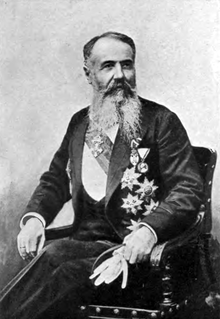Nikola Pašić
|
His Excellency Nikola Pašić |
|
|---|---|
 |
|
| Prime Minister of Yugoslavia | |
|
In office 6 November 1924 – 8 April 1926 |
|
| Monarch | Alexander I |
| Preceded by | Ljubomir Davidović |
| Succeeded by | Nikola Uzunović |
|
In office 1 January 1921 – 28 July 1924 |
|
| Monarch |
Peter I Alexander I |
| Preceded by | Milenko Vesnić |
| Succeeded by | Ljubomir Davidović |
|
In office 1 December 1918 – 22 December 1918 |
|
| Monarch | Peter I |
| Preceded by | Position Established |
| Succeeded by | Stojan Protić |
| Prime Minister of Serbia | |
|
In office 12 September 1912 – 1 December 1918 |
|
| Monarch | Peter I |
| Preceded by | Marko Trifković |
| Succeeded by | Position Abolished |
|
In office 24 October 1909 – 4 July 1911 |
|
| Monarch | Peter I |
| Preceded by | Stojan Novaković |
| Succeeded by | Milovan Milovanović |
|
In office 29 April 1906 – 20 July 1908 |
|
| Monarch | Peter I |
| Preceded by | Sava Grujić |
| Succeeded by | Petar Velimirović |
|
In office 10 December 1904 – 28 May 1905 |
|
| Monarch | Peter I |
| Preceded by | Sava Grujić |
| Succeeded by | Ljubomir Stojanović |
|
In office 23 February 1891 – 22 August 1892 |
|
| Monarch | Alexander I |
| Preceded by | Sava Grujić |
| Succeeded by | Jovan Avakumović |
| Personal details | |
| Born |
18 December 1845 Zaječar, Serbia |
| Died | 10 December 1926 (aged 80) Belgrade, Yugoslavia |
| Political party | People's Radical Party |
| Spouse(s) | Đurđina Duković |
| Children | 3 |
| Religion | Serbian Orthodox |
| Signature | |
Nikola Pašić (Serbian Cyrillic: Никола Пашић, Serbian pronunciation: [nǐkola pâʃit͡ɕ]; 18 December 1845 – 10 December 1926) was a Serbian and Yugoslav politician and diplomat who was the most important Serbian political figure for almost 40 years, the leader of the People's Radical Party who, among other posts, was twice a mayor of Belgrade (1890–91 and 1897) several times Prime Minister of the Kingdom of Serbia (1891–92, 1904–05, 1906–08, 1909–11, 1912–18) and Prime Minister of the Kingdom of Yugoslavia (1918, 1921–24, 1924–26.)
He was an important politician in the Balkans, who, together with his counterparts like Eleftherios Venizelos in Greece, managed to strengthen their small, still emerging national states against strong foreign influences, most notably those of Austria-Hungary, the Ottoman Empire and the Russian Empire.
Pašić (Никола П. Пашић) was born in Zaječar, Principality of Serbia. According to Slovenian ethnologist Niko Zupančič, Pašić's ancestors migrated from the Tetovo region in the 16th century and founded the village of Zvezdan near Zaječar. Pašić himself said that his ancestors settled from the area of the Lešok Monastery in Tetovo.Jovan Dučić concluded that Pašić hailed from Izvor near Zaječar, and that Pašić's ancestry in Tetovo had been long lost; Bulgarians switched this, saying that he hailed from Teteven in Bulgaria.Ljubomir Miletić once claimed that Pašić's father or grandfather settled from Teteven, in Bulgaria (which was refuted), however, both of them were born in Zaječar.Carlo Sforza mentioned that Pašić "was lucky in another respect, he belonged to the Shopi community".
...
Wikipedia
